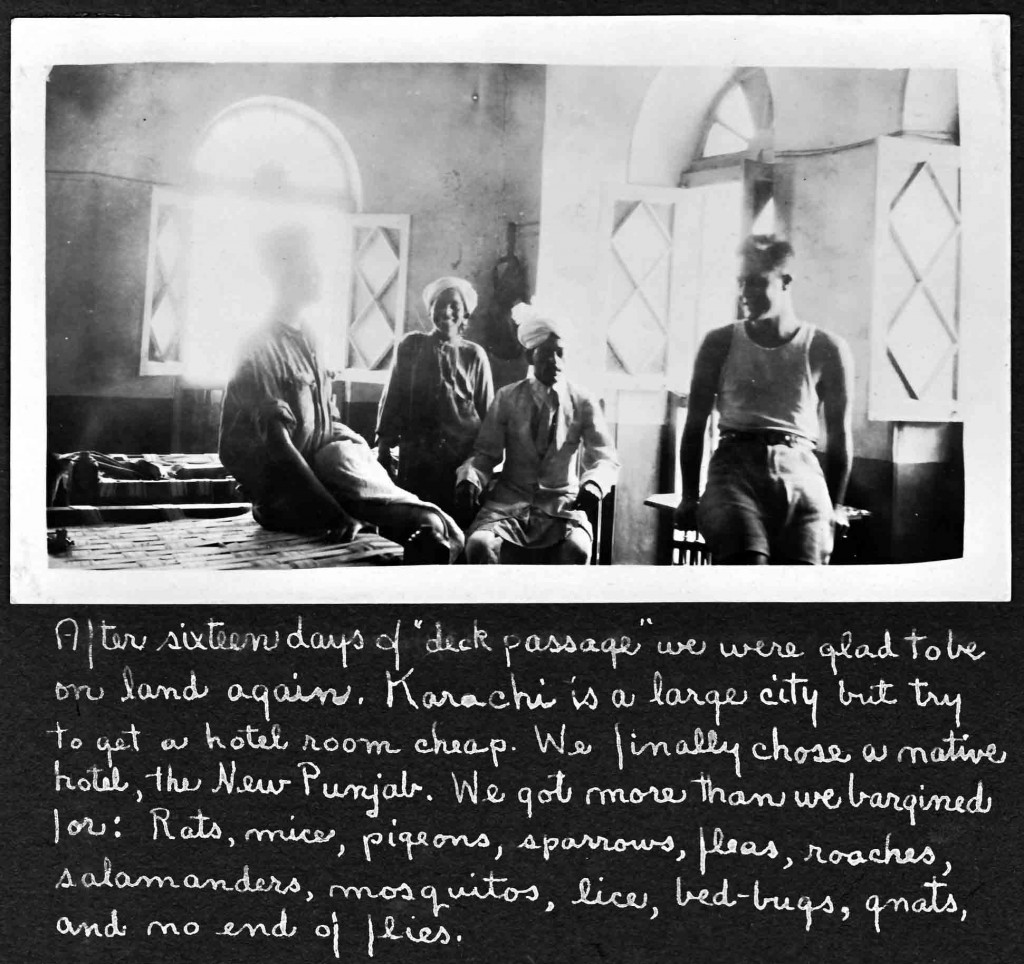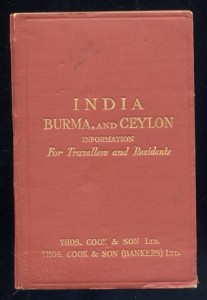OK Friday Sunday, April 5 5, 1929 Friday, April 5, 1929
Some time about 1AM this morning Mort and I walked up Bunder Street about two miles, returning near three. Frank had put his blanket on the floor and was asleep when we left. Returning, we discovered Frank dividing his time between fighting mosquitoes and bed-bugs and scratching. It all ended about 2:30 or 3AM when Frank and Mort piled on the latter’s bed because so far none had been found there, and I, distrustful and over-experienced in this predicament, snored away on a couple of chairs. The best thing about it all is the manner in which the proprietor treated the thing—”oh yes, you won’t get any sleep on the beds. It is better to sleep on the floor. Perhaps you would like to stay in an English hotel uptown? When we clean them out here, they always come back in three or four days.” That is not hard to understand, for not only this hotel and the native quarter are infested with these bugs, but most all of Karachi—and India according to reports.
After a shower, Mort and I went uptown to hunt a new place to stay. Frank was left behind to pack. We tried all sorts of hotels, native and otherwise, from a bare room for 20R a month for all of us ($7.40) to a large room, bath, and balcony, etc. in the best hotel at 80R a week with food for the three of us. Every one had bugs except this latter, and it may have had some too. Finally decided to come back to the first place and clean it out in true American fashion. Took the beds apart and burnt the joints, etc., getting an army of bugs. Then thoroughly swept it, took the blankets out for good, and brushed off the strips for the mattresses. I know the proprietor and his help thought us fools for bothering about these little bugs. It is against the Mohammedan religion and also the Hindu, I believe, to kill bugs, for bugs are the departed souls of ancestors.
 Mort and I went to market for some food in the evening and wandered down into the souk on the way back. The souk is the native quarters, the bazaars, etc. Those of Cairo are n.g. compared to those of Karachi. Streets widen and narrow, run criss-cross and at all angles, with absolutely no irregularity, making it very easy to get lost. Most of the buildings are two stories in height and not so old. The streets in the bazaars are lined with tiny shops containing all imaginable types of wares. The owners sit squatting on a small raised platform or else the floor, where they can see all that goes on in the street. No doors nor front walls to these shops. All open to the street. Here is a grain seller, perhaps two dozen large straw baskets in front of him full of all sorts of rice, wheat, barley, corn, oats, etc. In the back of his shop barrels and larger baskets contain more grain. There is a sweet shop. Large tin pans cover a display table sloping toward the street. There is a candy looking like crisp spaghetti, gelatins with nuts on the top, a white taffy-like sweet, things that look like tarts, a yellow corn-mealy-looking substance, and a dozen other kinds. If at day, the flies are thick around it. There are some men threshing wheat on a large cloth in the street. Shoe shops, tobacco shops, bakery shops, tin-ware stores, all busy making their wares. Herds of cattle roam at will through the streets. Some of the main streets and squares of the souk are choked with cattle so you can pass only by picking your way through them. In fact, they wander loose all over town, in the main streets or no, chewing rubbish or paper from the gutters. Mort claims they enjoy cardboard especially. At any rate, they look well-fed and plump.
Mort and I went to market for some food in the evening and wandered down into the souk on the way back. The souk is the native quarters, the bazaars, etc. Those of Cairo are n.g. compared to those of Karachi. Streets widen and narrow, run criss-cross and at all angles, with absolutely no irregularity, making it very easy to get lost. Most of the buildings are two stories in height and not so old. The streets in the bazaars are lined with tiny shops containing all imaginable types of wares. The owners sit squatting on a small raised platform or else the floor, where they can see all that goes on in the street. No doors nor front walls to these shops. All open to the street. Here is a grain seller, perhaps two dozen large straw baskets in front of him full of all sorts of rice, wheat, barley, corn, oats, etc. In the back of his shop barrels and larger baskets contain more grain. There is a sweet shop. Large tin pans cover a display table sloping toward the street. There is a candy looking like crisp spaghetti, gelatins with nuts on the top, a white taffy-like sweet, things that look like tarts, a yellow corn-mealy-looking substance, and a dozen other kinds. If at day, the flies are thick around it. There are some men threshing wheat on a large cloth in the street. Shoe shops, tobacco shops, bakery shops, tin-ware stores, all busy making their wares. Herds of cattle roam at will through the streets. Some of the main streets and squares of the souk are choked with cattle so you can pass only by picking your way through them. In fact, they wander loose all over town, in the main streets or no, chewing rubbish or paper from the gutters. Mort claims they enjoy cardboard especially. At any rate, they look well-fed and plump.
Donkeys jam through narrow, crowded places pulling small carts after them. Huge camels, appearing like dinosaurs, walk disdainfully along, drawing large wagons behind them. In the busy intersections nearly every third shop is a sweet shop. The water is not so good to drink and many stands sell drinks of all kinds dirt cheap. Coffee 4¢, tea ¢, soda water 4¢, orange and lemonade 4¢. Almost always you get ice with your drink. We found an excellent drink like egg-nog with cinnamon and rose water in it for 4¢. Seems as though many of the drinks are flavored with rose water. We found rolls @ 8¢ per dozen, bananas, small @ 9¢ per dozen, and tangerines @ 37¢ a dozen.
Barbers sat along the sidewalks and shaved or clipped away at their customer who squatted before him. Whole groups of men, women, and children sat in the streets and on the sidewalks weaving mats or cutting reeds. Small children, half-naked, chase through the crowds or play in the hot dust, dirt, and filth. Few carriages venture into this section and no automobiles. At night these busy corners are brilliantly lit and throng with dusky humanity. In the daytime they are crowded and hot.
Men wear several different types of clothes. Some dress in European white suits of flannel, others wear only a small loin cloth. Many wear a loose pair of white trousers, similar to the Chinese but not so wide, and a shirt the tails of which hang outside. Long strips of white cloth wrapped around the head serve as turbans. Still others wrap a thin piece of muslin once about their middle, run the end between the legs, catching it up in the back. The ends hang down a little above the ankles in front and come to the knees in back. Sloppy looking, but cool. These also wear a shirt and turban. Some wear pink or red turbans.
The women are more colorful in their dress, wearing skirts reaching the ankles and a close-fitting waist, usually of yellow and red. Sandals on the feet, brass ornaments on the ankles and wrists and ears, and an ornament stuck through one side of their nose. There is often much cheap fancy-work, bead designs, etc. on their clothes. Many wear no headdress while others wear a long veil of red, yellow, or green, falling down their back to their waist or lower. Some children are also decked out in a gaudily-colored costume with much cheap jewelry, while others wear only a dress. Babies are carried on the hip, straddling it.
On the whole, the Indians are much more impressive than the Egyptians. They show a plus expression of intelligence contrary to the blacks of Massawa. Many of the men have a reserved, intelligent, honest sort of noble air about them, enhanced by black short beards. The women are often not bad looking and even those who labor repairing the streets carry themselves with an air of grace or dignity—like you imagine a Grecian status would walk. They are much better formed than Egyptian women and are not fat. They marry very young and it is not uncommon to see a girl as young as 15 or 16 going down the street carrying a baby and accompanied by a husband 20 years her elder.
It is interesting to take a walk at night. Hundreds of people sleep outside on benches, on the sidewalks, or in the streets. You have to step over them and walk around to get by.
